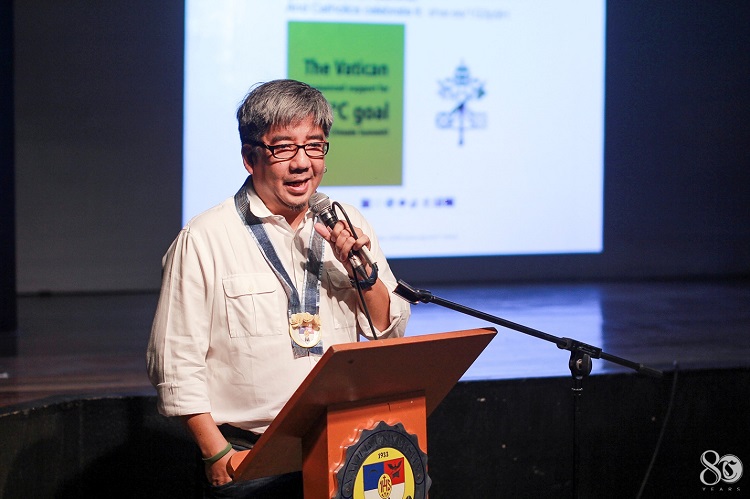
LAUDATO SI. Fr Roberto C Yap SJ, president of Xavier University and also an environmental economist, delivers his message during the Post-Paris Climate Conference at XU emphasizing on "Laudato Si," an encyclical of Pope Francis on responsible ecological stewardship.
Report by Jhon Louie Sabal
Photos by The Crusader Publication
The Social Sciences cluster of Xavier University invited key individuals who attended the historic Conference of Parties 21: The 2015 Paris Climate Conference (COP 21), for a forum on the question, “Why does the Paris Climate Change Conference matter in the Philippines?”
Renato Redentor Constantino, executive director of the Institute for Climate and Sustainable Cities, talked about how COP 21 impacts developing nations such as the Philippines at the XU Little Theatre on January 26.
“This is an epic year in mobilizing countries, demanding how the world should act regarding climate change,” Constantino said.
Over 190 member countries gathered in Paris, France to achieve a legally binding and universal agreement on climate change, with the aim of keeping global warming levels below 2 degrees Celsius.
COP 21 is significant for developing countries since they are considered most vulnerable to the effects of climate change. Through this agreement, the parties have agreed to keep the world at 1.5 degrees Celsius by reducing carbon emissions. The Philippines participated in and committed to the agreement.
Constantino presented important data on existing initiatives by major carbon emission contributors in curbing the negative impact of climate change. For instance, he said that China set two new world records in clean energy in 2015. The first is for installing a record 30.5 gigawatts (GW) of wind in a single year, and the second for installing 16.5GW of solar.
Although COP 21 and the commitment of industrialized nations like China are good developments, Constantino cautioned that climate change impacts will continue to be felt in the next 20 years. He said that the impacts we experience today are due to emissions years ago.
COP 21 and developed nations
Giving the perspective of developed nations was Lisa Junghans, policy advisor of Germanwatch. Junghans presented major discussions in the global media about the Paris Climate Conference. There were resounding pessimisms about the success of the conference. However, the parties led by the seven most developed nations were able to draft the agreement which would surpass the Kyoto Protocol adopted in Berlin in 1995.
According to Junghans, the major outcomes of the COP 21 agreement, besides the 1.5 °C limit, include support for countries that find it difficult to adapt to climate change. This Solidarity Package consists of capacity building and financing on existing climate change initiatives, among others. There is also the principle of equity for bigger economies to reach out to smaller economies for climate change adaptation and mitigation. World leaders of the seven big economies consisting of Canada, France, Germany, Italy, Japan, the United Kingdom and the United States also agreed to de-carbonize their economies. There is also the commitment to ensure that all financial investments are climate compatible.
However, Junghans emphasized that this is only the beginning and that the agreement remains to be in paper until it will be translated into polices and initiatives among countries, for example, when countries such as China and United States decrease their contributions to the world’s carbon emission.

GLOBAL CONTRIBUTION. Renato Redentor Constantino, executive director of the Institute for Climate and Sustainable Cities, shares on the Philippine Government’s commitment to the COP21 Paris Climate Agreement.
Local participation
Journalist Ben Cyrus Ellorin imparted on how local communities can be a part of the COP 21 initiative. He iterated that rich economies considered to be big contributors of carbon emission should finance existing initiatives to reduce the impact of climate change particularly on the most powerless members.
He said, however, that there is no problem when it comes to climate financing. The real challenge is in establishing mechanisms that empower localities and make them part of the planning process. For Ellorin, the best solution is to empower the cooperatives and let them handle financial resources and mobilize the capital.
“Opportunities are only waiting to be maximized,” he said.
Students’ interests
Half of the conference was allocated to reactions and comments from the Xavier community. Aristeo Raphael T Marbella III, AB Philosophy student and member of the Union of Students for the Advancement of Democracy in Xavier University (USAD-XU), asked the importance of the forthcoming elections in improving the local economy of Mindanao, especially on the discussion of finding alternatives sources of energy.
As a response, Constantino challenged the students, consisting of first time and young voters, to be wise in electing the next leaders of the country and in Cagayan de Oro. He said that leaders should aim for sustainable investments by empowering the locality in identifying alternative power supply options that solve the current problem of power shortage without compromising the future consumption of the next generations.
He also added that to empower the locality, there is a need for pro-active citizenship where citizens don’t act as observers only but also as prime actors in formulating policies and initiatives about finding the best energy alternatives.
“There must be policy incentive, and prices of coal and solar power should be carefully studied,” he said.
Meanwhile, Junghans suggested for trust building and bilateral talks between key stakeholders and partners. The case of successful communities, such as Paris, can be good literature for this, she said.
Gerald Leigh C Laquinon, BS Business Administration - Financial Management student and member of the League of Filipino Students, asked the role and significance of capitalism in solving financial crisis without setting aside climate change.
Constantino underscored the need for a more participative citizenship. He stressed that capitalism or any economic system alone cannot solve the concern on climate change.
The conference served as an entry point for faculty members of the College of Arts and Sciences to take part in more collaborative and multidisciplinary research engagements that will show the “how” in mitigating and adapting to climate change for a more resilient community.
Two days after the conference, the dean’s council of the College of Arts and Sciences met with Junghans to explore possibilities for a research project engaging the programs of the college to find the best scheme and mechanism in reducing climate impacts, especially in Mindanao.
